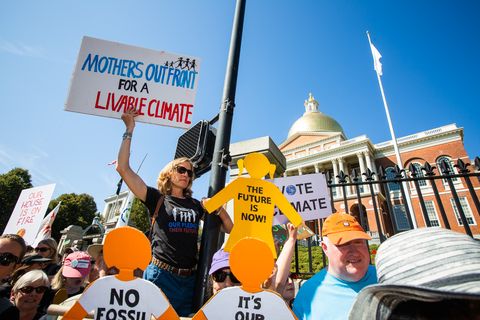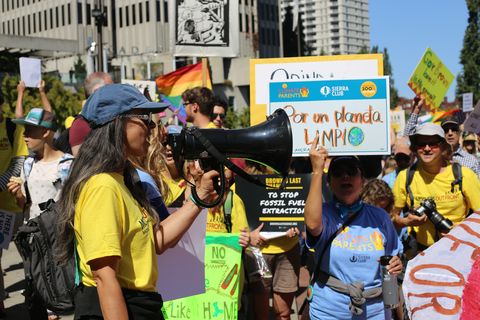In February, a couple weeks before COVID-19 spread through the U.S., a group of mothers in San Diego gathered in a living room under colorful balloons and a birthday banner from a recent party. One mom brought her baby girl to the meeting, dressed in a fuzzy pink vest. The mothers, most of whom are Mexican-American, live in San Ysidro, a neighborhood of San Diego close to the U.S.-Mexico border. They were there to discuss how the San Ysidro School District had cut a bus route, forcing some of their children to walk a few miles to and from school each day.
Sandy Naranjo, a mother of two who organized the meeting, told the group that slashing the school district’s transportation budget was connected to other disparities. She passed around her laptop with a map showing local pollution levels, zeroing in on a swathe of wealthier neighborhoods to the north that had been colored green to indicate low levels of air pollution. Naranjo then zoomed in on the patches of red and orange—the areas with high air pollution. The mothers’ eyes widened as they pointed out their neighborhoods. “Why didn’t we know about this?” one said with alarm.
Some women are opting not to have biological children due to the climate crisis—a topic that attracted more attention after congresswoman Alexandria Ocasio-Cortez mentioned it during a recent Instagram live-stream. “There’s scientific consensus that the lives of children are going to be very difficult,” she said. “And it does lead young people to have a legitimate question: Is it OK to still have children?” In the United Kingdom, some women are formally abstaining through BirthStrike, a group committed to the movement. Proponents cite a 2017 study that suggests having fewer children is the greatest lifestyle choice people can make to shrink their carbon footprint.
For years, though, a starkly different movement has been taking hold as well. The women who met in San Diego to discuss air pollution are part of Mothers Out Front, a growing crusade of moms, grandmothers, and caretakers pressing their communities to adopt climate-friendly policies. Their motivation rests on a different notion: that mothers are in a distinct position to leverage change—that their appeals to protect children might uniquely resonate with those in power. And so far, it’s working: Since 2016, the group has successfully pushed Massachusetts and California to adopt new laws promoting clean energy and regulating gas leaks, convinced dozens of cities and towns to embrace renewables, and stopped or postponed gas projects in Massachusetts, Virginia, and New York. “I sensed in my feelings of despair and outrage, there was power in that, a mother’s love for her children,” says cofounder Kelsey Wirth.
The idea for the organization began in 2011 when Wirth, the former president of Align Technology, which makes Invisalign, was reading her three-year old daughter a book about coral reefs. As she flipped through the book’s vivid drawings, she realized coral reefs could potentially go extinct during her daughter’s lifetime. Wirth was familiar with climate issues through her father, Tim Wirth, a former U.S. senator and congressman from Colorado who helped co-sponsor some of the first Congressional hearings on global warming in 1988. It occurred to Wirth that, all these years later, not much had changed.
In 2012, Wirth met with Vanessa Rule, a longtime climate organizer and fellow mother, and together they launched Mothers Out Front in Massachusetts the following year. They organized hundreds of house parties across the Boston area, where mothers discussed important local climate-related issues. From there, chapters opened in New York and then spread to Virginia, Colorado, California, and Missouri. The group now has over 23,000 members nationwide.
There is a long history of mothers in the environmental movement. In the early 20th century, many American women campaigning for clean air and water were open that motherhood was the force behind their activism. At the time, lobbying as mothers allowed women to participate in politics, according to Dr. Susan Conradsen, a professor of psychology and women’s studies at Berry College in Georgia, who has studied maternal activism.
Decades later, as women gained more rights, activists relied less on their role as mothers, though some continued to embrace it. In the 1960s, women protesting pollution from nuclear testing held out photos of their children. Throughout the 1980s and ‘90s, mothers across the country led campaigns against toxic waste in their communities. Conradsen says that present day activists are following in those women’s footsteps by reclaiming the title of “mother” without fear that it will diminish their authority. “We don’t have to only use it and we don’t have to dismiss it,” she said. “It can be part of our identity.”
Many members of Mothers Out Front are seasoned activists, while others are recruited at school functions and are learning about climate issues for the first time. Leaders teach other moms about the legislative process and how to tell their own stories in a way that engages politicians. They also provide them with childcare while they attend hearings and protests. Though some moms choose to bring their children along when they meet with legislators to help drive their points home.
In June 2018, Gina Cacioppo, took her then infant daughter with her to the county legislature in Ithaca, New York, urging them to stop a local coal plant from transitioning to natural gas. (Although methane gas emits less carbon than coal, activists say gas can deter communities from adopting renewable energy, which would have greater impact in lowering global emissions.) As Cacioppo spoke, her daughter dangled from her in a baby sling, cooing and grasping at the microphone. “I’m asking you to protect my baby in a way that I cannot and I wish I could,” she told the legislators. Ultimately, the county legislature sent a letter to the plant opposing the transition and the plant announced they would use the space for a data center partially powered by solar energy instead. Mothers Out Front considers it one of their first major wins.
Today, the group’s largest national campaign is to get school districts to switch to electric school buses, 94 percent of which are fueled with diesel in the U.S. One diesel school bus alone releases 27 tons of greenhouse gas emissions annually, which is equivalent to five gasoline-powered cars.
One of the moms steering the effort is Maria Villanueva, a member of the San Diego chapter. The issue is personal for her; in the early 2000s, her daughter developed severe asthma while living next to an autobody repair shop in National City, a suburb south of the city, which was zoned to allow dozens of industrial businesses, resulting in high air pollution. (In 2005, children in National City were hospitalized for asthma at a 57 percent higher rate than the county average.) Villanueva and the National City moms ultimately failed in their effort to get their district to adopt electric school buses, but Mothers Our Front succeeded in two other local school districts this year, including Chula Vista Elementary School District and San Ysidro.
Mothers Out Front devotes considerable energy to linking fossil fuels—mostly from methane gas—to children’s health and safety. In 2016, after learning that children in homes with gas stoves have a higher risk of experiencing asthma, more than 100 mothers in Boston packed into a Boston City Council hearing (so tightly that one council member said there were “mothers everywhere!”). Ultimately the group succeeded in getting the Massachusetts Legislature to pass laws requiring utility companies to repair leaks more quickly, to address leaks that have environmental impact, and release information on “lost and unaccounted for gas.”
In Virginia, where the proposed Mountain Valley Pipeline, a 303-mile long natural gas pipeline starting in West Virginia, is under construction, Mothers Out Front brought together rural families who are uneasy about potential gas leaks. Desiree Shelley, an organizer in Roanoke and mom of two daughters, told me conversations about gas leaks and children’s health are particularly sensitive and that families can panic if they’re not also given potential solutions. Mothers Out Front is deliberate when giving families facts and advice. “Hope is important, but it can’t just be hope as some abstract idea,” Shelley says. “It has to be something that is attainable.”
On July 12th, during a hot weekend in San Diego, a fire broke out on a Navy ship docked a few miles off the city’s coast. Shortly after the fire began, a portion of the vessel exploded. Within a couple hours, Naranjo’s living room smelled like burning plastic, even with the windows shut. Her phone lit up with texts from mothers in the area: “Oh my gosh, can you breathe?” Then, the mothers started questioning why the government hadn’t notified them about the disaster.
As the stench lingered, Naranjo and her husband evacuated with their two young children, but she says other families couldn’t. The incident deepened the importance of one of their other campaigns in San Diego. Since the pandemic began, Naranjo and Villanueva teamed with other activists and doctors to persuade the city to create an office dedicated to environmental justice. In October, they won. The staff members will be bilingual and address problems that contribute to racial disparities in San Diego’s air pollution, like zoning and permit decisions for polluting businesses—issues the mothers say have been long overlooked. For Villanueva, the victory means she may one day watch her daughter play sports outdoors without worrying about what she’s inhaling. “[Moms doing this activism] makes a difference,” she said. “It makes all the difference in the world.”
This content is created and maintained by a third party, and imported onto this page to help users provide their email addresses. You may be able to find more information about this and similar content at piano.io


